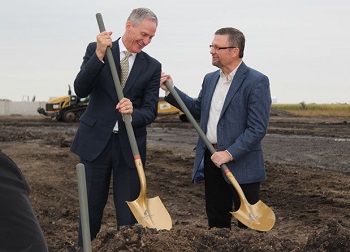There’s a new kind of farm going up north of Canton, in southeastern South Dakota.
Its barns will house cattle like many farms in the area have done for more than a century, but these cattle won’t be raised for their meat or milk. They’ll be producing antibodies that can treat human diseases.
 |
|---|
| Gov. Dennis Daugaard and SAB Biotheraputics CEO an founder Eddie Sullivan prepare for a ceremonial groundbreaking at the SAB farm site north of Canton, S.D., Oct. 5. |
Sioux Falls-based SAB Biotheraputics broke ground Oct. 5, on an 80-acre site. Construction of the first barn is underway, and hopes are to have it ready by the end of November. An office building will be built there, too, and there’s room to expand with more barns capable of housing 400 animals.
SAB uses cloned cattle with certain human DNA. The cows are injected with a vaccine and produce antibodies to fight disease. By taking the plasma from their blood and sterilizing it in a Sioux Falls lab, the antibodies could be used in humans to battle some of the worst diseases, including Ebola and Zika.
The company’s latest focus is treating the type of flu that puts people in the hospital. Some people don’t respond to flu shots, but an influenza therapeutic produced by SAB could help them.
“We think we have a solution, and we are working on it,” CEO and co-founder Eddie Sullivan said, adding that they are working toward the first clinical trials on influenza.
If approved, SAB’s cattle are ready to produce the treatment. The new facility could make enough of the antibody to meet worldwide demand, using just 20 percent of its capacity, Sullivan said.
SAB just completed its first trial in humans for treating MERS or Middle East Respiratory Syndrome. The results showed that the cow-made antibodies worked just like human antibodies to treat the disease.
“That’s what we expected,” Sullivan said. “But we had to show the world. We had to show the FDA.”
Gov. Dennis Daugaard was on hand for the ceremonial groundbreaking. He said SAB has done much to advance the biotech industry in South Dakota.
“When you think of a world without such diseases – often fatal diseases – it really brings new hope and new meaning to today,” he said. “It’s not just about business. It’s about saving lives.”
It took more than 25 years of work to genetically engineer cattle capable of making human antibodies, and those years were challenging, said Dr. Jim Robl. The retired scientist helped clone the first cattle with human DNA and helped refine the technology that makes SAB’s work possible. He was instrumental in bringing SAB to South Dakota and continues to serve on the company’s scientific advisory board.
Bioscience isn’t a new area in the agricultural industry, but in South Dakota, the work is largely focused on crops, Daugaard pointed out. He said he’s impressed with the way SAB is taking genetic technology into the pharmaceutical world in a very innovative way.
SAB will start by moving its 35 cows that now live at the Trans Ova Genetics facility across the border in Iowa. Those cows were implanted with embryos the day after the groundbreaking, preparing to create the next generation of antibody-producing bovines.
The first biosecure barn, measuring 360 feet by 50 feet, will hold up to 80 cows, and a staff of four will work there. At full capacity, the facility could handle 400 head with 40 employees, according to Todd Stahl SAB’s executive director of animal management. He said they will be good careers, and SAB will be a contributor to the local economy as well as a good neighbor.
Stahl was raised on a dairy farm near Freeman, S.D.
“Growing up, I’d never imagine that you can do this with cattle – saving people’s lives,” he said.
Bill Hood lives a half mile from the future SAB farm. He has a well repair business and farms 30 acres. He said he’s seen many changes in the Canton area over his 40-plus years there, and he thinks SAB is a good fit for the agricultural community.
“The future looks pretty neat,” he said.
SAB leaders are hoping the company’s work has an impact far beyond Canton. Sullivan said he hopes to have a global impact.
“We have had some great successes,” he said, “but this is just the beginning.”
Source: SAB Biotheraputics news release



Leave A Comment